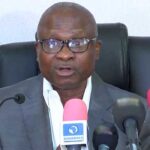…Make marternal health services free-Prof Ladipo
By Hassan Zaggi
As Nigerians prepare for the general election next month, experts in the health sector have charged the in-coming government to give greater priority to the sector for the good of all Nigerians.
Speaking at a symposium organised by the Healthcare Transformation Coalition (HTC) with the theme: ‘Repositioning the healthcare sector: Creating the pathway to an effective health system’, in Abuja, weekend, the experts regretted that, over the years, the health sector could not received the needed attention, hence, the many challenges confronting it.
HTC is a coalition of all members of the different health care professional groups in the health sector including doctors, pharmacists, laboratory scientists and all the rest who are stakeholders in the health sector.
Responding to questions in a panel, the President/CEO · Association for Reproductive and Family Health, Prof. Oladapo Ladipo, charged the in-coming government to make maternal health services including antenatal care, labour, delivery and postpartum care free.
He also advocated for all related Family Planning (FP) services to be free and that all Nigerians who need such services should have access to them at the right time.
He insisted that the best way to reduce maternal deaths in the country is to make family planning services totally free of charge.
Prof. Ladipo who is a globally renowned obstetrician and gynecologist called on the in-coming government to build on the successes the President Muhammadu Buhari-led government has achieved in the health sector.
While calling for more investment in health and education, he charged the in-coming government to scrutinized all the already existing policies in the health sector and investigate why they were not being implemented.
He, however, warned that without investment in family planning “Nigeria cant achieve any Sustainable Development Goals (SDGs).
Speaking earlier, the convener of the Symposium, Dr. Jide Idris, disclosed that governance and leadership were the major challenges hampering the growth of the health sector in Nigeria.
Dr. Idris who is the former Commissioner for Health in Lagos state, said: “One of the basic problem in the health system is leadership and governance. It is a major problem. But people don’t understand what leadership and governance is.
“We cannot move forward without a proactive leader. A leader that has vision who knows what he wants to do. He has the ability to tell the people working around him to do the same thing. That was what Bola Ahmed Tinubu did in Lagos when he was governor.
“Apart from that, because of that foresight, he set up a governance structure, it is key. These are processes that will help you address the problems in the system. To provide solution, you have to have policies, plans, you have to have legislations, decision making processes and many things. These are things that are on ground that we need to build upon them and he created that culture of continuity.”
He revealed that the coalition is a professional group which is to support the implementation of policies and also to support political agenda in the health sector.
Dr. Idris explained that the HSC was brought together to be able to advice the in-coming government appropriately on the right approach to take in building the health sector.
He said that “over the years, healthcare professionals have always reacted to health policies. The government set policies then we start reacting, if we don’t want the policies may be we start going on strike.
“We feel this time around, we should be involved in setting the health agenda because at the end of the day, health is very body’s business. Government has a role, professionals have a role and individuals have a role to play.
“Over the years, we always believe that government knows everything, that is not correct. Government are human beings, they are not healthcare professionals. So it is left for us the professionals to show the direction and tell them what to do or what we want done.
“Over the years, people shy away from this. We cannot get a good health sector if we don’t play the politics. This is essentially why we are here.”
He disclosed that the symposium was organised as part of many activities, one;, according to him, “is to mobilise all health workers, friends, colleagues in getting them to be very political.
“We all have our candidates. Every body knows my candidate, I work in Lagos State. My candidate is Asiwaju Tinubu. I am not going to hide it. Among all the candidates, he is the best because he has experience.
“He may not know it all. If something goes wrong, it will fall back on the professionals, now is the time to be proactive.
“This symposium is part of the activities and to look at the APC manifesto which coincides with all the challenges in the health sector. This time around, we will not complain, we will not grumble, we need to proffer concrete solutions in the context of what is happening in the environment.
“We have different stakeholders, different specialists in all aspects, let them come out with concrete solution so that we can articulate and pass on to the next government.”
Dr. Idris further said that at the end of the symposium, “we are going to collate all the suggestions and give to the in-coming government.
“As a coalition, our work has not finished, we need to work again towards the implementation of these things. We need to create a force to ensure that these things are implemented. That is our role.”
On her part, the former Commissioner for Health, Borno State, Dr. Salma Anas Kolo, disclosed that when Kashim Shetima was governor of Borno state, he transformed the health sector despite the fact that the Boko Haram crisis was at its peak.
She noted that a lot can be learnt from the Borno experience and used to transform the health sector in the country.
According to her: “Borno state was an epicenter of crisis when Shetima was governor but he did everything possible to revamp and rebuild the health system.
“There is much we can learn from what Shetima did in Borno state because the leadership was resilient and resources was dedicated to capacity building of health workers including training of indigenous health workers who are back now and working in the health system in the state.
“A lot can be seen in terms of leadership as of that time. Community and religious leaders were also involved that time in mobilizing and promoting healthcare services among the citizens.
“We were able to have a very resilient health system even though the crisis was still there.
“Another challenge that was prevalent during the peak of the crisis in Borno was gender based violence. Safe spaces were built and those who were sexually abused were provided psycho social counselling and treatment.
“There are a lot of lessons that we can learn from the Borno experience during the time of Gov Shetima in the health sector and replicate in the country without wasting much time.”



